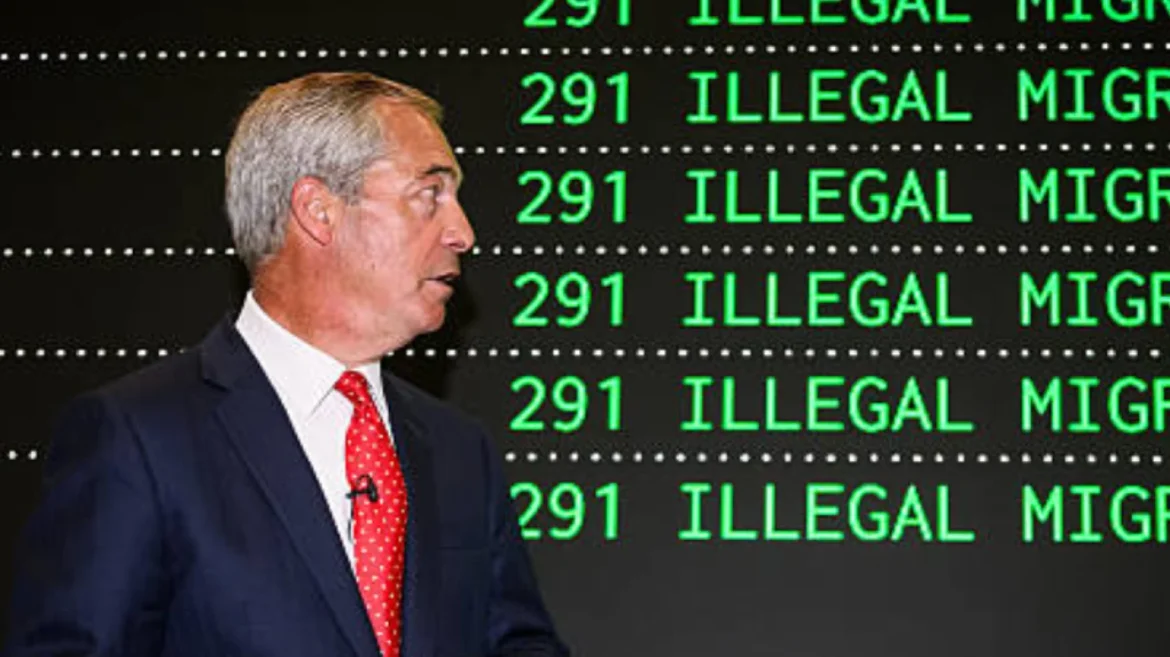Reform UK has presented a radical immigration plan that would see between half a million and one million people being deported over five years in the event of the party winning the next general election. As a part of its “Operation Restoring Justice,” the party plans to radically tidy up the existing asylum system of the UK and its border policies, referring to its security issues, legal sovereignty, and economic savings as the main drivers.
Fronted by Nigel Farage, the strategy proposes new stern measures to bar asylum-seeking claims by migrants who come in small boats. Besides, it provides £2 billion in support or incentives to the countries-such as Afghanistan and Eritrea, to enable them to accept back their migrants. Those countries that do not cooperate may be sanctioned. This radical policy is one of the most ambitious immigration programs to be brought up in recent UK politics.
Table of Contents
ToggleWhat is in the Reform UK Plan?
The essence of the proposal is direct detention and deportation of migrants who come through the irregular routes. Such people would, under the plan, be kept in converted RAF stations or new detention centres of which might be located in rural parts of the UK. The capacity is aimed at housing as many as 24,000 individuals within 18 months.
The party also intends to deport people to countries like Rwanda and Albania or use the British territories overseas, like the Ascension Island, as detention centers. Reform UK IV claims that deportation flights would escalate to five flights per day, with migrants offered the choice of returning voluntarily and receiving 2,500, which is described as a carrot and stick approach. Here is the link to our article on Tories Deportation Plan.
What is the Mechanism Reform UK Will Use to Question Deportees?
On the legislative agenda, Reform UK will introduce a new Mass Deportation Bill that would impose on the Secretary of Home Affairs a duty to deport all illegal migrants. This law would also make it permanently illegal to deport persons to return to the UK.
In order to facilitate their enforcement, the party is planning to pull out the UK as a signatory of the following important international treaties: the European Convention on Human Rights, the 1951 Convention on Refugees, and so on. According to them, such treaties already constrain the UK in its capacity to deport individuals as fast as possible. A new British Bill of Rights would replace the existing Human Rights Act and would only apply to the citizens of the UK and legal residents.
What Are the Legal and Political Problems?
The proposal has raised an instant political and legal blowback. Critics of other parties claim that the plan does not provide any practical logistical detail, particularly not how detention facilities would be constructed, nor the means of deporting illegal aliens to unfriendly countries.
As the legal analysts also argue, cancellation of international agreements would detach the UK and open it to judicial action. Furthermore, the proposed deportation quotas are many times greater than those recorded at present; in 2016 alone, slightly over 10,000 asylum-related removals were recorded. Here is the link to our article on Asylum Policy Reform.
Does the Plan have Popular Support?
The small party that has only four parliamentary seats is gaining momentum in opinion polls, particularly among those voters dissatisfied with the current system of immigration. The party estimates that over 650,000 people are illegally in the UK, and they argue that this figure supports why there should be mass removal. Their estimate is, however, an approximation because they cannot count the number of undocumented persons.
Certain sections of the population might react well to the tone of the decisive manner of the plan, especially in areas that have been affected greatly by the irregular migration. However, some take issue with its implications concerning human rights as well as its practicality.
What Is the Wider Context for Americans With This Proposal?
The UK has suffered a distinct increase in irregular influx, and more than 28,000 migrants have crossed to the English Channel in fairly small boats this year – a 46 percent rise compared to the same period in 2020. A new record of 111,000 asylum applications were made in the 12 months up to June and had adding further pressure on housing, services, and border control agencies.
In reaction, the government has been negotiating with France on a one-in-one-out pilot scheme, whereby migrants come and go back in exchange for accepting vetted asylum seekers. Critics note, however, that this does not do much to prevent the growing number of arrivals.
Final Thoughts
The mass deportation proposal by Reform UK is a radical change in terms of immigration policy. As well as raising several legal, ethical, and logistical questions, with promises of new legislation, detention abroad, and mass deportations, the plan raises considerable questions. It remains to be seen whether it picks up traction or whether it is to face insurmountable difficulties, but the way in which the UK will deal with migration in the years to come now takes the focus. This suggestion will leave mass deportation as a prime concern during the next election.


